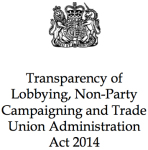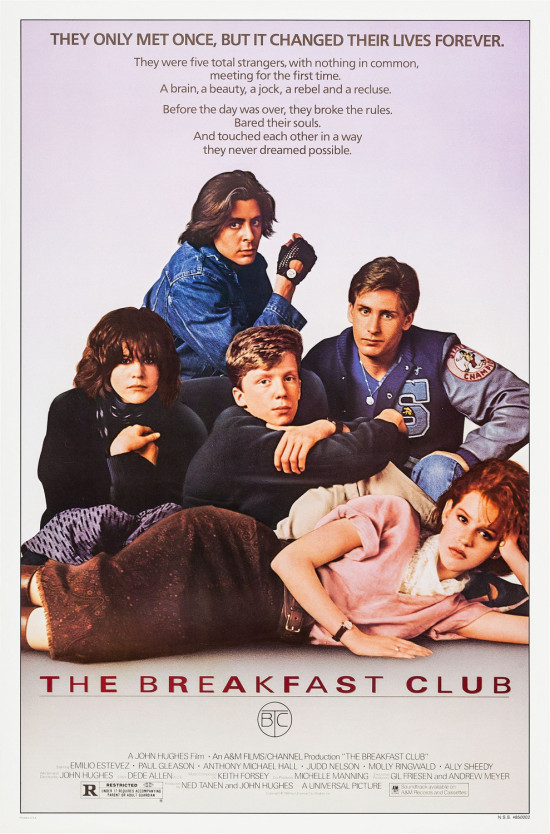
Original US release date: February 15, 1985
Production budget: $1,000,000
Worldwide gross: $51,525,171
The late director-writer John Hughes not only made a name for himself through his coming-of-age teen comedies in the eighties, but carved out a niche for a style of filmmaking that he defined and made his own. Hughes only has eight directing credits to his name, but his work continues to influence filmmakers to this day (Marvel Studios and director Jon Watts made no secret about the fact that Spider-Man: Homecoming was largely crafted in his style). The Breakfast Club was Hughes’s second directorial effort and was a huge success, grossing more than 51 times its production budget. That’s the kind of success that today’s movie studios struggle to replicate – relying almost entirely on big-budget spectacles to make money – but over 30 years ago, Hughes made it look easy with little more than five young actors and a high school library.
The premise of The Breakfast Club is simple: five high school students are sentenced to a Saturday in detention for various indiscretions. Making the scenario more interesting is the fact that all five students originate from different social circles. As defined by the official poster (as seen above – perhaps the wordiest poster in motion picture history), our cast consists of a brain (Brian, as played by Anthony Michael Hall), a beauty (Claire, Molly Ringwald), a jock (Andrew, Emilio Estevez), a rebel (Bender, Judd Nelson), and a recluse (Allison, Ally Sheedy). As they are forced to spend nine hours together, they begin to see beyond each other’s stereotypes to the real people underneath, learning valuable life lessons along the way.
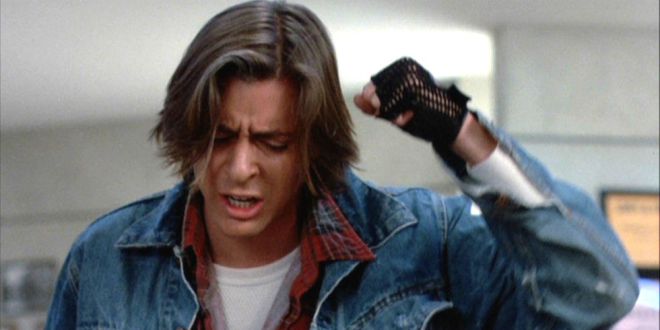
The principal cast takes Hughes’s script and direction and run with them. All five of these actors made names for themselves in the eighties and most of them have this particular film to credit for that. The movie is powered entirely by dialogue and character and without a cast that was able to carry the weight on their shoulders, it never would have worked, much less still be talked about more than thirty years later. Only Ringwald’s performance contains a couple of moments of inconsistency. That might be an unpopular observation, but there are definitely moments here and there where her physical performance doesn’t match the intensity of her verbal performance. But they are only a couple. For the rest of the film, she and the others are all spot on and show great versatility, especially for such a young (at the time) cast.
The movie shines in its character interactions and dialogue, but where it really earns its reputation and longevity is in its subtext. Not only does the narrative highlight the similarities in us all despite our more superficial differences, but it also serves as a poignant reminder of the difficulties of the high school years and of youth, in general. It’s often easy to forget the pressure that young people feel from all sides. There’s pressure from their parents and families. There’s pressure from their friends. There’s pressure from society. There’s pressure from school. And – perhaps most of all – there’s pressure from themselves. The expectations placed upon these people who typically aren’t yet fully emotionally equipped to handle it is often overwhelming. Hughes and his cast flawlessly communicate that through the screen to a likely-unsuspecting audience.
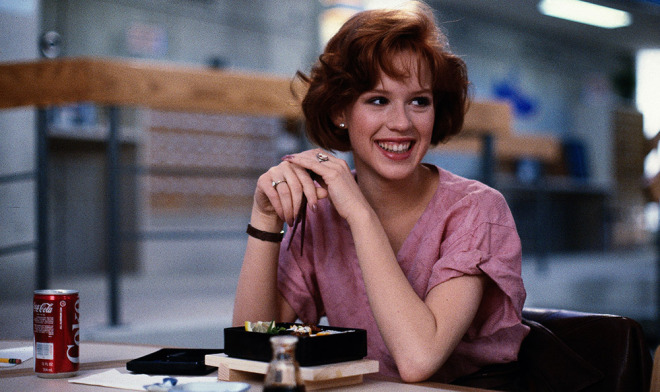
Amidst the laughs (of which there are plenty) are also weighty scenes of vulnerability. The revelations here are sometimes touching, other times alarming, and occasionally endearing. The characters are so disparate in their natures that some are downright disturbing in their most honest moments while others are genuinely funny. But, at the heart of it all, each of them is struggling for support and unconditional acceptance. It’s something anyone of any age can appreciate and the heartfelt method used in translating that idea to the audience goes a long way towards explaining this film’s continuing status as a favorite for many who were there for its original release and others who have discovered it in the decades since.
If one is going to nitpick, there are opportunities to do so. The vice principal of the high school, Richard Vernon, is with the students on that Saturday, attempting to monitor their behavior from his office across the hall. They manage to make an awful lot of noise that he somehow fails to hear throughout the film. A bigger issue than that is the seeming lack of emotional permanence of some of the interactions that the students have with each other. In one scene, they may be practically coming to blows, while a mere fifteen minutes later, the same students are laughing at each other’s jokes. This is not how teenagers work in the real world. Nobody holds a grudge like a teen. That’s just one example, but there are repeated instances of a perceptual resets such as this one throughout the film.
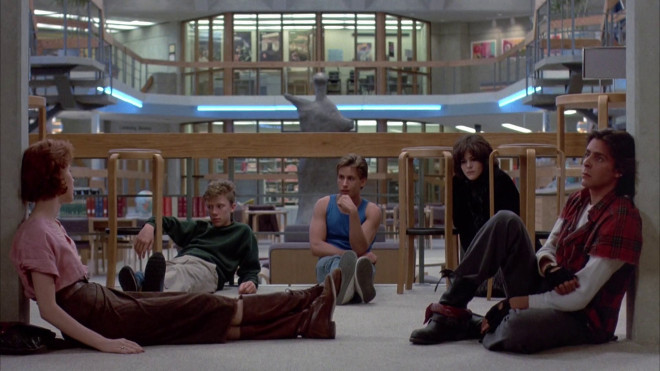
But, when it comes down to it, The Breakfast Club is the sort of film that is so timeless, perceptive, and relevant that those sorts of issues don’t carry all that much significance. The few negatives are easily and monumentally eclipsed by the brilliant positives. This is the kind of film that should be seen by every single teenager, especially as the pressures on that age group only continue to mount. It’s harder to be a teen age today than it likely ever has been and John Hughes offers a refreshingly insightful perspective that can only help anyone who is willing to listen to it. For those who are beyond that age and survived it (though not necessarily unscathed), the movie is still a funny, heartwarming, and entertaining flashback to the days when we thought life was the toughest it would ever be. No matter who you are or where you’re from, The Breakfast Club understands you.
Like us on Facebook!
Advertisements Share this:


